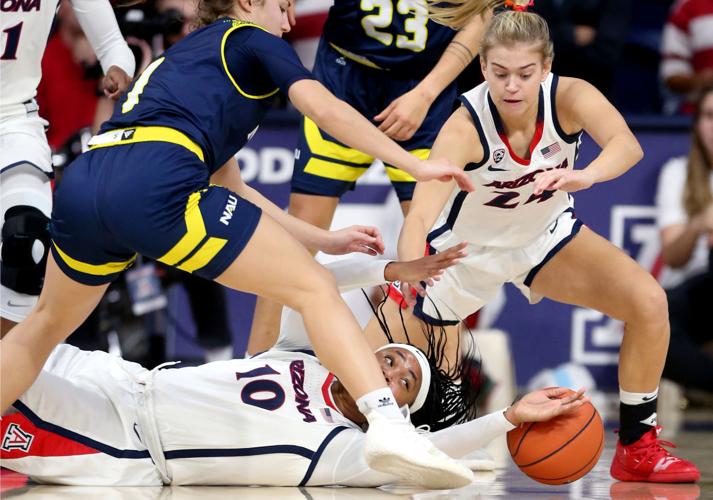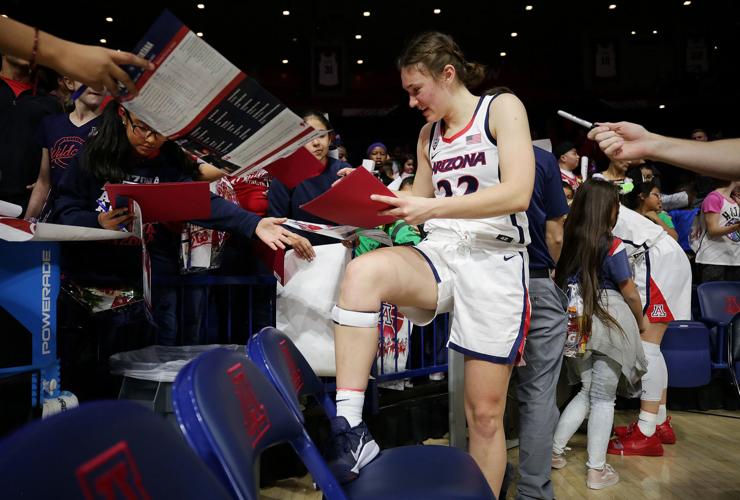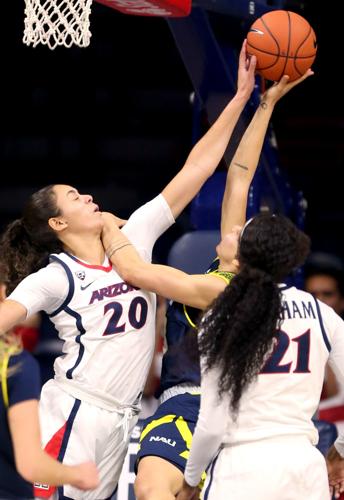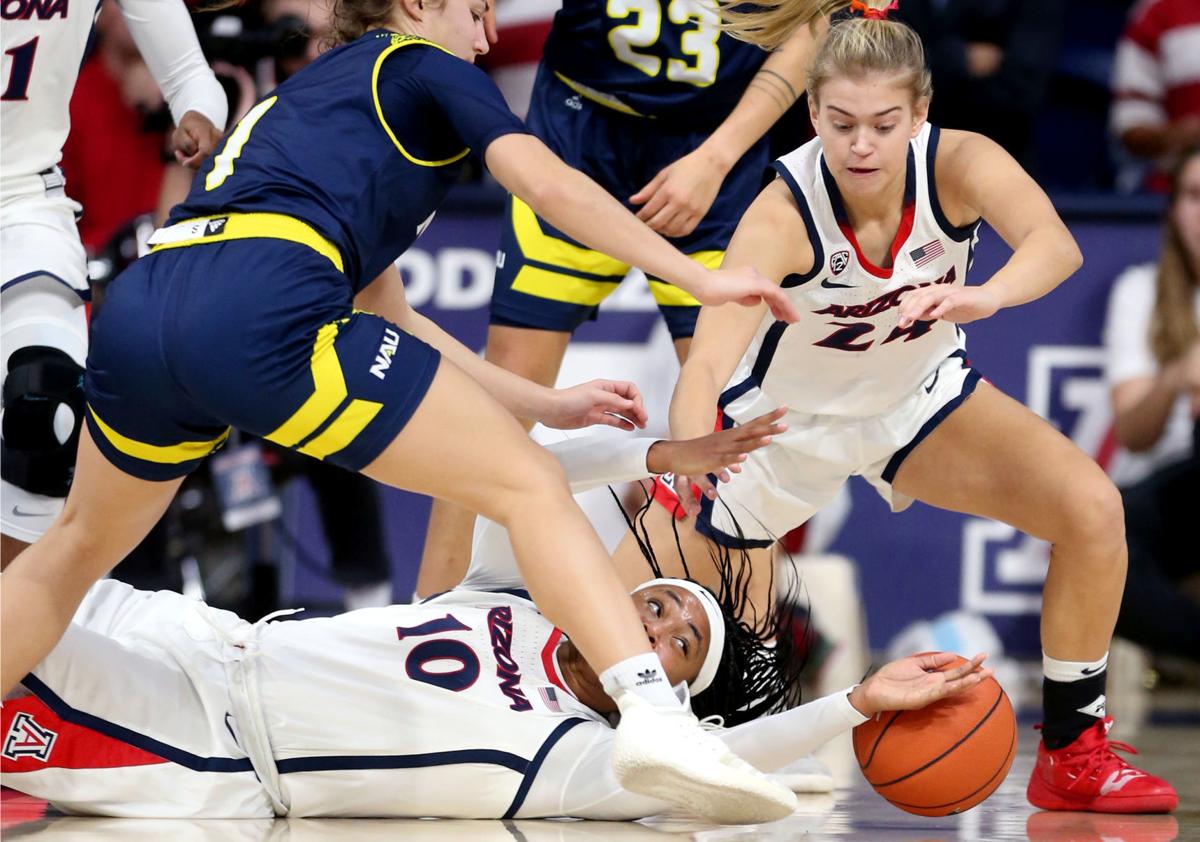Lindsey Malecha, Tee Tee Starks and Dominique McBryde are connected.
It’s not just that they play for the Arizona women’s basketball team. Or that all three are upperclassmen.
It goes much deeper than that.
All three are all from the Midwest. Both Starks and Malecha are from Minnesota — towns that touch the Twin Cities. McBryde is from Bedford, Indiana.
And all three play with an uncommon toughness on the court.
“It’s a nature-versus-nurture thing, and being from the Midwest has an effect on it,” said Malecha, whose team takes on Utah (18-5, 7-5 Pac-12) Friday night at McKale Center. “People are hearty in the Midwest. It comes from that farmer culture; growing up in that rough climate and pushing through it. Not that any of us grew up on a farm, but we still have that same social climate.
“In addition, playing basketball in Minnesota is rough like no other place. In AAU, it felt like a different type of play than in other states. We were scrappier and more physical, especially in the Twin Cities. We didn’t play lightly. While I wasn’t in Indiana, I think it’s the same around the whole Midwest.”
McBryde has a resiliency and brings a “swagger and a different flavor to her game,” Starks said.
She has a blue-collar style, often denying and “bodying” her opponent when playing defense.
Starks is the same way. She has said that when an opponent scores on her once, she’s going to do everything in her power to not let it happen again. It’s ingrained in her.
“My mom is a fierce competitor,” Starks said. “She emphasized being tough in basketball. I don’t think there is anything to be scared of. These players are just like us. They put on jerseys just like us. I don’t think there is anything to be scared of, that’s why I play the way I do.”
Maybe the weather has something to do with it, too. All three have dealt with — and powered through — a tough climate for most of their lives. When a snowstorm hit Seattle last weekend, leading to the cancellation of Arizona State’s game at Washington, the UA’s Midwestern trio barely blinked. They made fun of UA assistant coach April Phillips — a Californian — who couldn’t get enough coats on her to keep warm.

Arizona Wildcats guard Lindsey Malecha (22) signs a poster for some of the schoolchildren in attendance after the University of Arizona Wildcats vs. University of Montana Grizzlies women’s college basketball game, Dec. 5, 2018, in McKale Center in Tucson, Ariz. Arizona won 100-51.
“People were freaking out about three inches,” Malecha said. “We are used it. My dad a while back called and said he came home from a trip to a foot of snow in the driveway. It’s normal.
“When I was younger and we lived in a smaller town, we didn’t have access to a gym. As soon as it was a little warmer and I didn’t have to wear a full snowsuit, and the driveway was cleared, I was out practicing my handles. My mom didn’t want me dribbling in the house. In California, you can go out and shoot hoops all year round. In Minnesota, I had to find other ways to get the work in.”
Starks thinks the lesson they are learned early on from the weather was preparation.
“You have to be prepared for what is being thrown at you,” she said.
Even when it’s something unexpected.
Both Starks and Malecha have dealt with serious injuries. Starks has had four surgeries, with the latest one coming on her hip last spring. Malecha’s big surgery occurred after her senior year of high school; doctors repaired a complete tear in her right ACL and partial tears in her MCL and meniscus in the same knee.
“Lindsey and Tee Tee have dealt with a lot of injuries and that experience and adversity has made them stronger and tougher,” McBryde said. “They’ve taken their intensity to another level. They each have a little edge to them more than others.”

Arizona forward Dominique McBryde (20) goes high in the paint to knock away a shot by Northern Arizona forward Kaleigh Paplow (23) at McKale Center, Friday, December 21, 2018, Tucson, Ariz.
At times during their recoveries, they’ve both had to ask themselves if they really wanted to go on and keep playing. The answer was simple: Yes.
“I am not a quitter, and I wasn’t going to quit until I reached my goal,” said Starks. “It’s good to see how far I’ve come. I’ve pushed through certain things.”
Malecha’s recovery took much longer. It was three years before she played competitively for the Wildcats.
“I’ve always had that mentality that if I work hard I can do anything,” said Malecha. “When I was injured it took on a new meaning. I had to ask myself if I really still wanted to play basketball. I didn’t want to be done I pushed through to get back to the level I was before. Having that mindset did deliver an extreme amount of grit and perseverance in my personality.”
That word — grit — sticks with UA coach Adia Barnes.
“It’s what you are made of; you can’t teach someone to want it badly,” she said. “Either you have it or you don’t. Tee Tee has it. You could tell her she is guarding (star players) Diana Taurasi, Sue Bird or Candace Parker and she’ll do it. And, she’s not afraid.
“For Lindsey, it doesn’t matter if she’s 12th or first (on the roster) or competing to get into medical school … She’s going to work until she gets in. These type of people always reach their goals.”
Rim shots
- Sunday’s game against Colorado (11-12, 1-11 Pac-12) with be Arizona’s second RISE Unity Game. RISE was founded by Stephen M. Ross, owner of the NFL’s Miami Dolphins, to use the power of sports to improve race relations and drive social progress. The UA is asking fans to wear blue; the first 1,000 fans will be given rally towels with Unity Game II on them.







